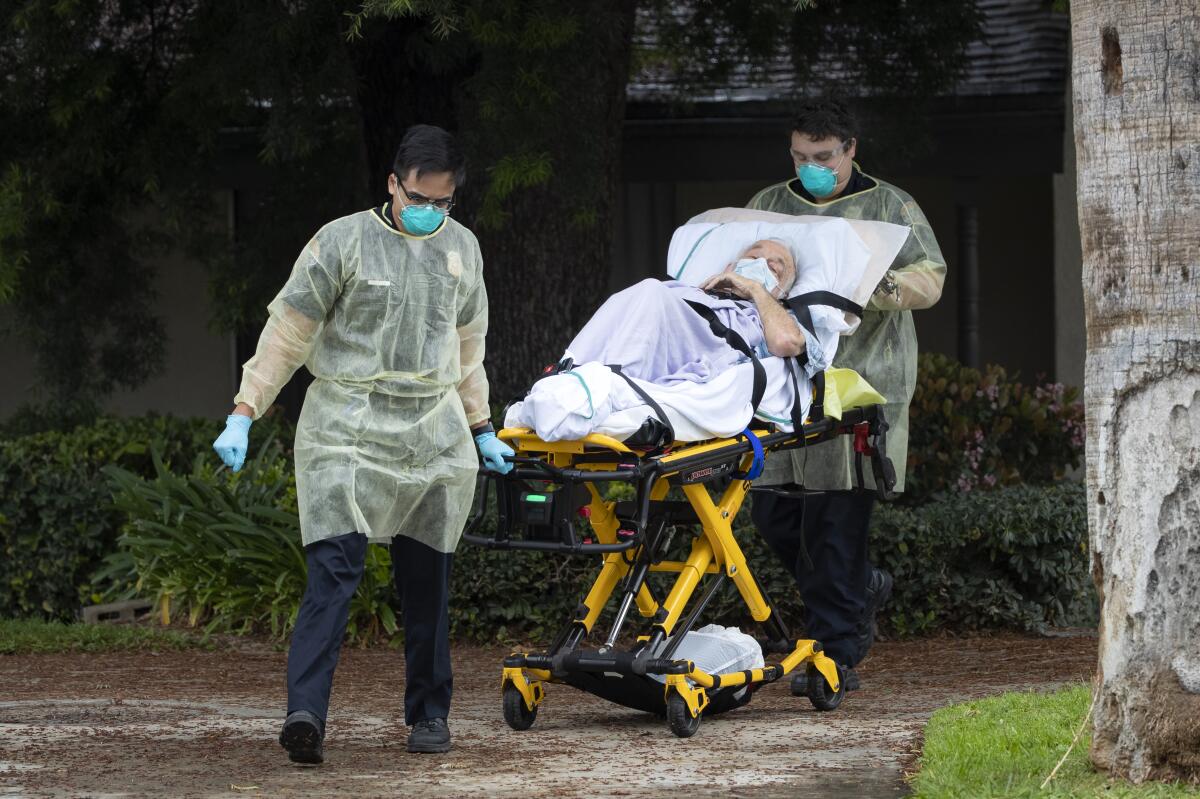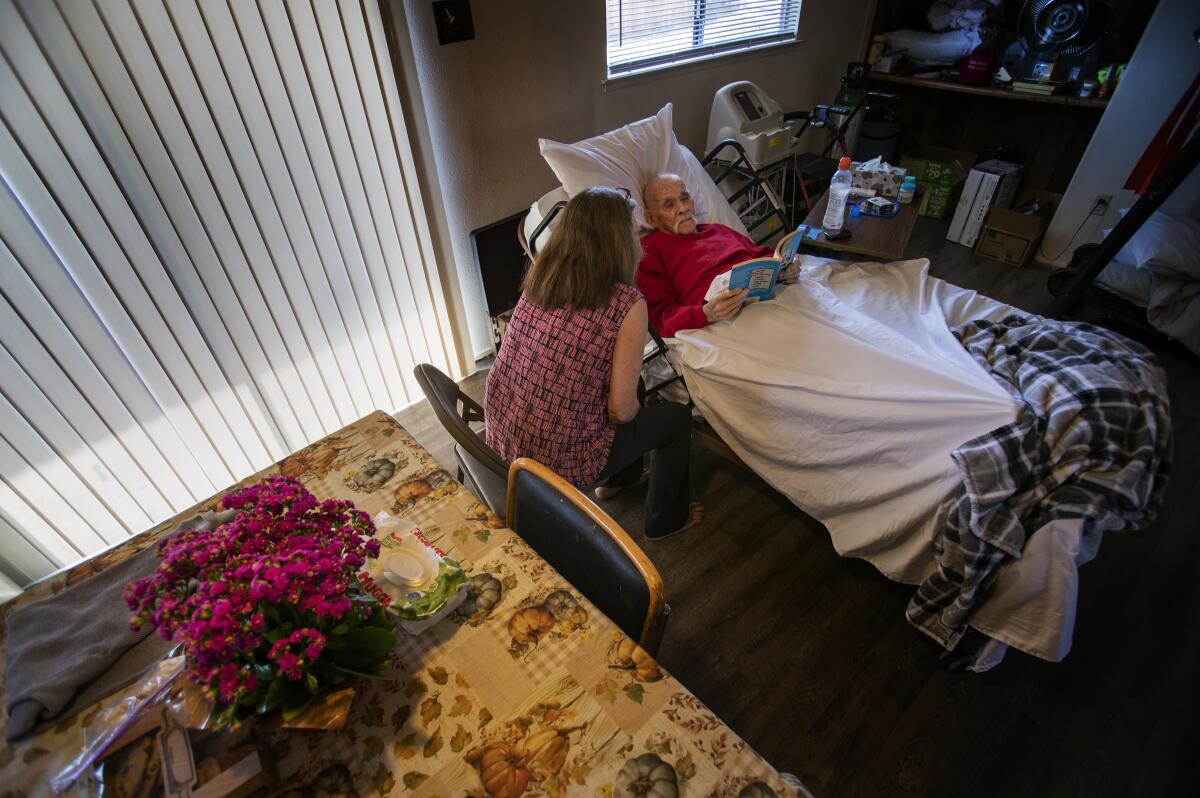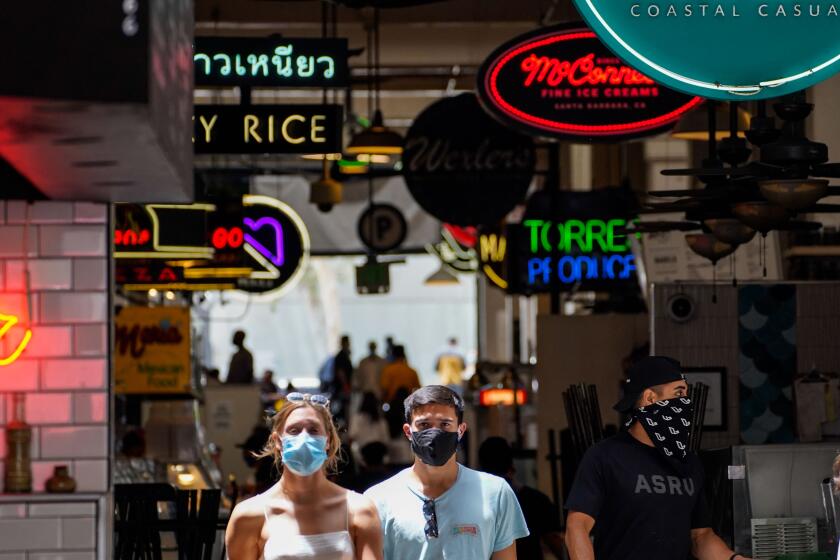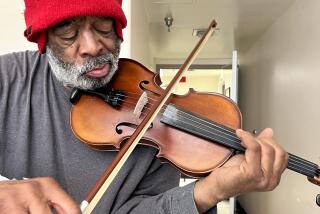As coronavirus raged through nursing homes, inspectors found nothing wrong

In early April, state inspectors completed a survey of Magnolia Rehabilitation and Nursing Center in Riverside as part of a federal effort to make sure nursing homes were protecting elderly residents from the coronavirus.
Their one-page report concluded: “No deficiencies.”
The next day, April 8, a fleet of ambulances lined up outside Magnolia to evacuate all 83 residents after the staff refused to show up for work, terrified of the deadly infection already spreading within the facility.
Similar scenarios played out across California this spring, survey records show. Time and again, inspectors sent to assess nursing homes’ ability to contain the new virus found no deficiencies at facilities that were in the midst of deadly outbreaks or about to endure one.
At Hollywood Premier Healthcare in Los Angeles, inspectors found the facility to be in compliance on March 30. Three days later, the home had 68 confirmed cases, county records show. Later that month, the National Guard was deployed to assist the overwhelmed facility.
State officials conducted five surveys this spring at Kingston Healthcare Center in Bakersfield, which is on a federal shortlist of the worst nursing homes in the country. Each time, the surveyors found the home in compliance with infection control protocols, even as the virus would eventually spread to 158 residents and staff, killing 21.
A Times review of inspection records found that, as of mid-June, California Department of Public Health inspectors had carried out more than 1,700 “COVID Focused Surveys” at skilled nursing facilities since late March and had issued just 14 infection control citations as a result of those visits.
Nursing homes have become hotbeds of coronavirus deaths in California, accounting for 43% of all fatalities across the state. The failure of the inspections to identify problems is just the latest indication of how the industry and regulators were unprepared for the coronavirus and failed to act quickly to slow its spread. Nursing homes lacked basic supplies when COVID-19 began sweeping through the facilities. And even after the tragic scope of the crisis became obvious, regulators failed to require universal testing of residents and staff.
A California health department spokeswoman said inspectors were instructed to focus on providing support to the beleaguered facilities rather than enforcement. At the same time, she said, many homes struggling with the pandemic were still technically in compliance with infection control rules for skilled nursing facilities, but those rules were woefully inadequate for battling the highly contagious new virus.
Relatives of residents at several homes told The Times that they witnessed obvious failures by staff members to contain the virus. And elder-care advocates said the lack of enforcement shows that state regulators abdicated their primary responsibility to police nursing homes at a critical moment.
“These weren’t real inspections; they were more like courtesy call visits. At a time when residents desperately needed the California Department of Public Health to help protect their lives, it tolerated infection control violations that have proven so deadly,” said Patricia L. McGinnis, executive director of California Advocates for Nursing Home Reform.
“Why even have nursing home inspectors if they are not going to enforce life-threatening infection control violations in the midst of a pandemic?” McGinnis asked.
The alarming recent surge in COVID-19 cases appears to be driven at least in part by increases in infections among Californians ages 18 to 49.
Like most states, California’s nursing home population has suffered a heavy toll due to the pandemic. As of Tuesday, 2,441 employees and residents of the state’s skilled nursing facilities had died of COVID-19, state data show. That does not include staff and elderly residents at assisted living centers, which are not regulated by the health department and have also been hard hit.
The COVID Focused Surveys were designed by the federal Centers for Medicare & Medicaid Services but carried out by state and local health departments.
Inspectors were instructed to put almost everything else aside and concentrate on ensuring that the homes were prepared to face the pandemic. The goal was to prevent the virus from entering facilities, if possible. When not, regulators hoped to contain it with rigorous adherence to testing, quarantining, use of protective gear and hand-washing.
“Focusing only on enforcement in the rapidly changing environment of the early pandemic response would not have been beneficial to the vulnerable nursing home residents we work every day to serve,” Kate Folmar, a spokeswoman for California Health and Human Services, said in a statement. “We needed to find solutions to save as many lives as we could, and to limit the spread of COVID-19 among this very vulnerable population.”
In an announcement earlier this month, federal CMS administrators said more than 5,700 COVID Focused Surveys — roughly a quarter of them in California — were completed nationwide. They described the program as “part of the Trump Administration’s historic transparency efforts to ensure residents, families and the general public have information about COVID-19 in nursing homes.”
But the Center for Medicare Advocacy, a nonprofit patient activist group in Washington, D.C., noted that only 163 of the surveys — less than 3% — had cited any problems with infection control.
With tens of thousands of nursing home residents and staff already dead from the virus, “it is simply not plausible that facilities have no problems in their infection prevention and control practices,” said Toby Edelman, the center’s senior policy attorney.
In a call with reporters on June 4, President Trump’s CMS administrator, Seema Verma, essentially blamed nursing home employees for outbreaks at homes that had been given a clean bill of health, suggesting that some stopped following infection control protocols once inspectors were gone.
“When the inspector leaves the nursing home, things can change,” Verma said. “There’s some staff that may not be washing their hands at the frequency that we suggest, or in the situations that we suggest. There could be some lax practices around isolating patients.”
The California health department spokeswoman defended her agency’s April 7 inspection of Magnolia Rehabilitation, saying it confirmed the facility had “infection protocols in place.”
“When staffing levels dramatically fell, the situation at Magnolia rapidly changed,” Folmar said in her statement, referring to the work stoppage the day after.
But some staff had refused to show up for work on the day the inspectors were in the facility, and Riverside County health officials were already aware of at least two Magnolia employees testing positive in the days leading up to the inspection.
When the staff abandoned the facility the day after the inspection was completed, Riverside County health officials scrambled to evacuate all of the residents.
Dan Erwig was shocked to hear that inspectors had found no problems with infection control measures at Magnolia, where his 85-year-old dad, Bernie, resided for about two weeks before the mass evacuation.
“What kind of deficiencies were they looking for?” Erwig asked. “This nursing home was a joke.”
Magnolia’s administrators did not respond to calls for comment.
Erwig’s father had been transferred from a local hospital to Magnolia in late March for rehab. At that point, Erwig and his family were unaware of any COVID-19 cases at the home. Soon after, his dad’s doctor stopped entering the facility, informing the family that employees were not wearing masks or other protective equipment.
“He was concerned about the conditions,” Erwig said.
The family only learned about the evacuations through the news. When they arrived at Magnolia to search for Bernie Erwig, he was nowhere to be found, sparking a long, agonizing search. They didn’t find out where he was until midnight.
“This is a human being. This ain’t cattle, where you just rush them out and put them wherever you want and not even call us,” Dan Erwig said.
Two days later, he learned his father had tested positive for COVID. He has since recovered.
“It was a living nightmare,” Erwig said.

The COVID survey at Hollywood Premier was completed on March 30, according to the state report. Los Angeles County health department records show that by April 2, the home had already reported confirmed cases among 43 residents and 25 staff — making it all but certain the outbreak was in full swing during the state inspection.
A lawsuit filed last month by the family of a resident who died of COVID-19 alleges there was a serious outbreak at the facility by mid-March after an administrator contracted the disease and failed to test residents and staff.
“This is another example of a facility where we know there was a very bad COVID outbreak and yet the state survey gave them a pass,” said Anne Marie Murphy, a lawyer representing the family of Army veteran Vince Martin, who filed the suit.
By late April, Hollywood Premier was among a handful of homes hit so hard by COVID-19 that the National Guard had to be deployed to fill in for missing, sick employees.
Administrators at Hollywood Premier did not respond to requests for comment.
In other cases, inspectors found no infection control deficiencies at facilities with long histories of quality issues, including citations for failing to follow infection control protocols.
Last year, state inspectors found 85 violations at Kingston Healthcare Center in Bakersfield, including failure to provide proper care for residents with rotten teeth and swollen, blackened toes. In 2018, inspectors found a resident’s oxygen filter clogged with thick brown debris.
Nevertheless, on April 13 a pair of nurses representing the state health department concluded Kingston had “implemented recommended practices to prepare for COVID-19.”
Ten days later, families were posting on Facebook about emerging cases.
As the outbreak flourished in the weeks that followed, state health inspectors performed four more surveys. Each time, they concluded the home was following infection control protocols and found no deficiencies.
Kristen Morris, a representative of Rockport Healthcare Services, which oversees Kingston, wrote in an email that “the infection control survey confirmed that Kingston was doing everything ... to prevent COVID-19 from entering and spreading at the facility.”
She added that staff at the home had “been in constant communication with state and county officials, who have visited on several occasions and continue to find that Kingston is in full compliance with best infection control practices.”
Terrie Flores’ 95-year-old mother lived at Kingston for more than five years. But in March, she noticed that staff weren’t wearing masks and gloves. In May, after several days had passed with no results from her mother’s COVID-19 test, Flores called an ambulance to transfer her out of the home. She tested positive and suffered pneumonia, but has since recovered.
Now Flores says she and relatives of other residents are considering their legal options.
“We want them closed down. We want them knocked down,” Flores said. “Who’s the person that is signing off that they were in compliance? Who signed off that Kingston was OK?”
Angelica Uriarte’s grandfather, Gonzalo Moya, lived in Kingston for 19 years before contracting COVID-19 in April. He died of it last month.
Uriarte said she has no faith that the home followed infection control protocols.
“I’m furious. I’m angry, I’m disappointed, I’m hurt,” she said. “How did it get this bad?”
More to Read
Sign up for Essential California
The most important California stories and recommendations in your inbox every morning.
You may occasionally receive promotional content from the Los Angeles Times.













